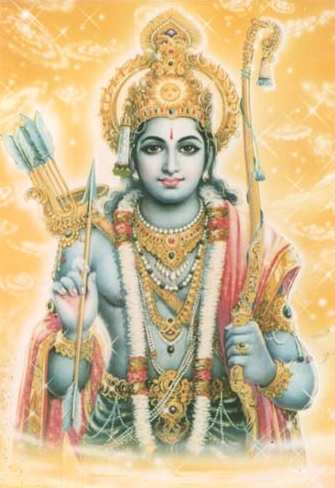The Vedic Scriptures
The following important Vedic scriptures will be presented here in brief:
Rāmāyana
The Rāmāyana, whose author is known as Valmiki, is a poetic work describing in 24,000 verses the transcendental pastimes and attributes of Śrī Rāmacandra, an incarnation of the Supreme Lord, as king of Ayodhya. The Supreme Lord appeared on earth in this form long ago (in the treta-yuga) to destroy demons, to protect the pious and to show by his own example how kings should rule the world. He was popular with everyone, everyone loved and honoured him. The Mahabharata says: “He is a true king of whom everyone says with pride and joy 'this is my king!'”
 Some time after his marriage to Sītadevi, the goddess of fortune, Śrī Rāma was banished to the forest for thirteen years by a promise his father, King Daśaratha, had once made to one of his consorts. This consort of the king did not want Rāma to become the heir to his father's throne but instead her son should be the king and therefore Rāmacandra, accompanied by Sītadevi and Laksmana, one of his three brothers, had to live in the forest. They wandered trough many beautiful forests, mountains and valleys. Sri Rama had to kill many demons, who were creating havoc and were a great disturbance for the sages and ascetics living in the forest – all this is vividly described by Valmiki, the author. In the 12th or 13th year of exile Sītadevi was abducted by the ten-headed demon Ravana. Ravana's kingdom was Sri Lanka. The Rāmāyana tells how Rāma, together with Laksmana, Hanuman and an army of monkey-like beings, went to war against Ravana, destroyed the demon and his army and liberated Sīta, how they returned to Ayodhya, how Rāma became heir to the throne and ruled his kingdom, etc.
Some time after his marriage to Sītadevi, the goddess of fortune, Śrī Rāma was banished to the forest for thirteen years by a promise his father, King Daśaratha, had once made to one of his consorts. This consort of the king did not want Rāma to become the heir to his father's throne but instead her son should be the king and therefore Rāmacandra, accompanied by Sītadevi and Laksmana, one of his three brothers, had to live in the forest. They wandered trough many beautiful forests, mountains and valleys. Sri Rama had to kill many demons, who were creating havoc and were a great disturbance for the sages and ascetics living in the forest – all this is vividly described by Valmiki, the author. In the 12th or 13th year of exile Sītadevi was abducted by the ten-headed demon Ravana. Ravana's kingdom was Sri Lanka. The Rāmāyana tells how Rāma, together with Laksmana, Hanuman and an army of monkey-like beings, went to war against Ravana, destroyed the demon and his army and liberated Sīta, how they returned to Ayodhya, how Rāma became heir to the throne and ruled his kingdom, etc.
It is most auspicious to hear about the transcendental pastimes and attractive qualities of the Supreme Lord. Such hearing paves the path to liberation from the cycle of birth and death.
The Rāmāyana has been filmed many times in India; it is performed in theatrical plays and exists as a radio play (in English). There are even two readings in German. The fact that this ancient true story has lost none of its magic to this day is due to the spiritual power inherent in the stories about the incarnations of the Lord.
